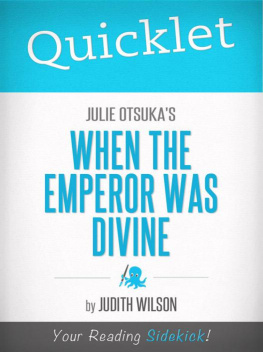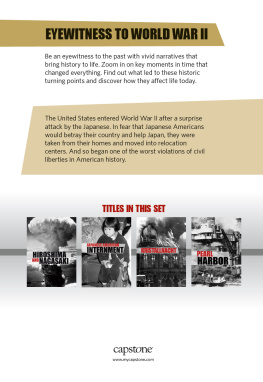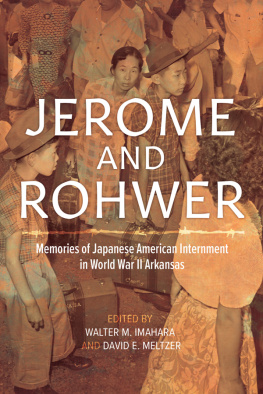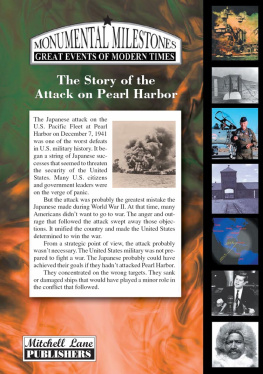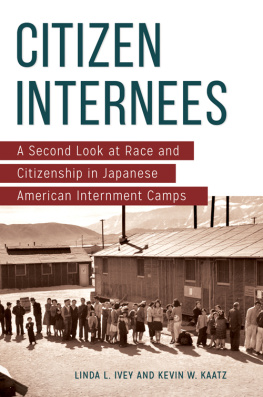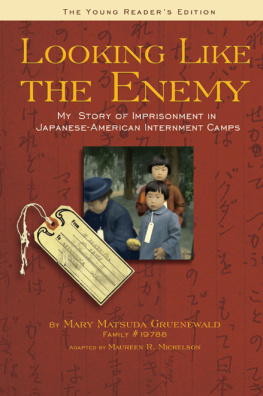Judith Mary Wilson - Quicklet on Julie Otsukas When the Emperor Was Divine
Here you can read online Judith Mary Wilson - Quicklet on Julie Otsukas When the Emperor Was Divine full text of the book (entire story) in english for free. Download pdf and epub, get meaning, cover and reviews about this ebook. year: 2012, publisher: Hyperink, genre: Art. Description of the work, (preface) as well as reviews are available. Best literature library LitArk.com created for fans of good reading and offers a wide selection of genres:
Romance novel
Science fiction
Adventure
Detective
Science
History
Home and family
Prose
Art
Politics
Computer
Non-fiction
Religion
Business
Children
Humor
Choose a favorite category and find really read worthwhile books. Enjoy immersion in the world of imagination, feel the emotions of the characters or learn something new for yourself, make an fascinating discovery.
- Book:Quicklet on Julie Otsukas When the Emperor Was Divine
- Author:
- Publisher:Hyperink
- Genre:
- Year:2012
- Rating:4 / 5
- Favourites:Add to favourites
- Your mark:
Quicklet on Julie Otsukas When the Emperor Was Divine: summary, description and annotation
We offer to read an annotation, description, summary or preface (depends on what the author of the book "Quicklet on Julie Otsukas When the Emperor Was Divine" wrote himself). If you haven't found the necessary information about the book — write in the comments, we will try to find it.
ABOUT THE BOOK
At its core, Julie Otsukas novel When the Emperor Was Divine is a story about characters, and she portrays them beautifully. With simplicity, distance, and precise attention to the details of the era, she draws on universal human emotions to create individuals whose experiences, thoughts, and perceptions open a window to the history of a troubling time in Americas history. The story begins in 1942, after the Japanese attack on Pearl Harbor during World War II, and it follows four members of one Japanese-American family as they leave their home in Berkeley, CA, and endure more than three years as internees in War Relocation Camps. Otsuka captures the guilt and shame, confusion and resignation that they feel, as they suffer indignities and loss resulting from the fears and prejudice of others, which theyve done nothing to deserve.
MEET THE AUTHOR
Judith M. Wilson is a writer, editor, and award-winning journalist. She and her husband live in Northern California with their family. Her interests include travel, learning languages, good food, and long walks.
EXCERPT FROM THE BOOK
Its spring, 1942 and a sunny day in Berkeley, CA, as an unnamed woman sets out to return a book to the library. The day starts out pleasant enough, but then suddenly, everything changes. Overnight, signs have appeared everywherein store windows, at the entrance to buildings, and stapled at eye level, to every telephone pole along University Avenue. The woman looks at one in the window of the post office and goes home. She never reaches the library. The woman is Japanese, and the United States is at war with Japan. The government believes that people of Japanese ethnicity who live in the coastal states of the western United States are a threat and is rounding them up and placing them in isolated internment camps inland.The authorities had taken her husband into custody the day after the attack on Peal Harbor, and he had already been sent to a camp out of state. Now she has learned that the rest of the family is about to be relocated. She spends the following days packing, deciding what to keep and what to throw out, and attending to the details, as she gets her family ready to leave their home for an unknown destination and an undetermined period of time.
CHAPTER OUTLINE
Quicklet on Julie Otsukas When the Emperor Was Divine+ About When the Emperor Was Divine+ About Julie Otsuka+ Overall Summary+ Chapter-by-Chapter Commentary+ ...and much more
Judith Mary Wilson: author's other books
Who wrote Quicklet on Julie Otsukas When the Emperor Was Divine? Find out the surname, the name of the author of the book and a list of all author's works by series.

